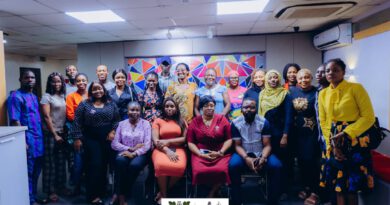NSML MD, Ahmed Calls For Free Access to Finance As Key to Ship Acquisition, Construction To Emerge As Major Global Player
By Raheem Ibrahim
The MD/CEO, NLNG Shipping and Marine Services Limited (NSML), Abdulkadir Ahmed has emphasized that free access to finance is key for acquisition and construction of ships that will propel the Nigerian maritime sector towards emerging as a global player.
He made the emphasis in his keynote address at the 2024 edition of Association of Maritime Journalist Association of Nigeria (AMJON) Maritime Finance Conference held at Sheraton hotel, Lagos on Thursday.
Alhaji Ahmed added that strict compliance with shipping standard regulations will ensure that ships are not only built and operated to the highest quality and safety standard but are also able to trade both locally and internationally.
He explained that shipowners and prospective players need to ensure a proper understanding of the dynamics that lead to success in the constantly evolving maritime sector.
According to him, “Shipping is a hugely capital-intensive activity, and accessing financing is key for acquisition and construction activities. Irrespective of the market owners play in, the importance and role of finance cannot be overemphasized”.
He added, “The need to have fully compliant vessels trading internationally is of paramount importance and all stakeholders must understand the ever-changing dynamics to ensure compliance right from the point of conceptualising the acquisition or construction of the vessels”
Stressing further, the NSML boss pointed out the importance of financial institutions including insurance institutions in the acquisition, construction and operations of vessels globally.
He revealed that the Petrofin Index for Global Ship Finance, the top 40 banks lending to shipping in 2023 was US$284.27bn, the total global bank lending of all banks, including local banks approached US$375bn in 2023.
Ahmed noted the significance of technical competence and expertise in shipping acquisition and construction, highlighting the complexity of the modern vessels, with the raft of advanced technology features, which demands a high level of skill and knowledge right from the design and acquisition phase up to their operation.
On the area of shipping standards, he explained that the landscape of maritime regulations is becoming more stringent with resultant impact on design and operations of both new and existing assets.
According to him, the NSML is unwavering in its operations of ensuring the vessels of clients are maintained to the highest standards globally, ensuring they are seaworthy, cargo-worthy and globally tradeable.
He said, “By so doing, we ensure that the owners enjoy a good return on investment (ROI) which is important to ensure the repayment of their loans”.
“The shipping and maritime industry is a highly regulated one with great emphasis on safety, reliability and environmental sustainability. Compliance with conventions, regulations and guidelines primarily issued by the International Maritime Organisation (IMO). IMO’s SOLAS (Safety of Life at Sea) convention, MARPOL (Maritime Pollution) convention are core pillars of operation in the global maritime industry.
“With the drive for decarbonization and emphasis on the need to reduce greenhouse gas (GHG) emissions, to combat the threats posed by climate change, there are a plethora of new rules and regulations owners need to be aware of when acquiring vessels.
“For us in NSML, we have been at the vanguard of driving compliance with standards and the regular training and development of our personnel to future-proof them in the ever-dynamic maritime industry”, he added.



